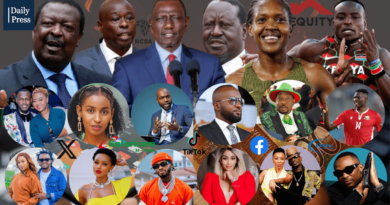Gender Equality Today For A Sustainable Tomorrow
As the world marks the International Women’s Day under the theme gender equality today for a sustainable tomorrow, we look at how far women and girls have come in the struggle against bias.
Today’s celebration is a culmination of what started many years ago. In 1908, women marched through New York City demanding shorter working hours, better pay and the right to vote. Two years later, Clara Zetkin founded International Women’s Day to celebrate how far women have come in society and raise awareness of continued inequality.
A century later, women and girls are still suffering from gender inequalities.
According to International Labour Organization (ILO), women and girls bear the brunt of unpaid care work. In Africa, women spend 3.4 more time in unpaid care work than men. What is more, women are working more hours than men when unpaid care work and paid work are added together. Without addressing heavy and unequal unpaid care work, women will continue to be disadvantaged in earning.
We all know our social norms where women are expected to do the majority care work and domestic chores resulting in few opportunities outside the home. Women must have the same opportunities as men in decision making and how they choose to spend their time
We must promote gender equality as one of the most effective ways to drive inclusive growth and reduce poverty, and the best way to do this is to ensure that women and girls have the opportunity to access education starting early in their lives.
Educated girls are healthier, have the skills to make choices about their own future and can lift themselves, their community and even their county out of poverty.
When you hear the voices of many women and girls, they simply want to succeed. They want the opportunity to make their own choices for an active participation in the community.
Anastacia Wairimu is a class 8 pupil at Bridge Muchatha Academy in Kiambu County. She is a confident girl who aspires to be a lawyer because she would love to be the voice of the voiceless, especially women who go through marital abuse. She would also want to represent women who want to sue deadbeat fathers for child negligence.
Anastacia says her mother is her role model because she inspires her to have a tough spirit. One thing she has learned from her mother is to always be self-driven, especially in a society that is not lacking in male chauvinists.
“I hope more parents will see the value of girls’ education and send their children to school. I encourage the government to create more opportunities for women and women in the job market and break gender barriers.” Says Anastacia.
Carolyn Wanjiru Mwangi is a teacher in the same Bridge school. She believes that she is in her position today because of girl empowerment and gender equality. She says that increasing more positions for women in the education sector and job market will have a positive effect on the economy.
As a woman who works, Carolyn says she has seen tremendous growth in women who are empowered through education.
“They are able to get good jobs or run good businesses which have given them financial freedom and stability. In return, women are now self-sustainable and do not need to depend on a man for financial support. We have seen women who are now breadwinners in their families. An empowered woman is unlikely to endure any form of abuse from her husband or partner.”
Carolyn draws her inspiration from environmentalist and Nobel Prize laureate the late Wangari Maathai.
“She broke gender barriers and stereotypes, and fought for the planting of trees that have given us beautiful sceneries. All women should be as strong and unshaken as Wangari Maathai was.” Remarks Carolyn.
She concludes by making a clarion call for the society to break gender barriers and empower more women. She says this will go a long way in strengthening young girls to fight for their right to education and a better life.
Bridge Kenya works in partnership with other organizations to empower women in the communities. One of these organizations is Mama Layla, which works on a programme called SuperMamas to empower marginalized women in remote villages with technical skills to assemble solar lighting units.

The SuperMamas programme is a network of over 2,000 women leaders in over 200 communities. These communities are in 40 of the 47 counties of Kenya. SuperMamas influence more than 60,000 women within the age of 23-50. These women are champions and vocal pillars within their communities. The women are involved in projects and businesses such as grocery food stuff stores, second hand clothes, salons and barbershops, tailoring, bookstore, and beadwork.
Read>>>Empowering The Next Generation Of Female Scientists
This year, we are called to imagine a gender equal world. A world free of bias, stereotypes and discrimination. A world that’s diverse, equitable, and inclusive. A world where difference is valued and celebrated.
Let’s heed to this call and ensure that we remove the barriers that keep women from realizing their full potential and their rights for equal opportunity and treatment.

